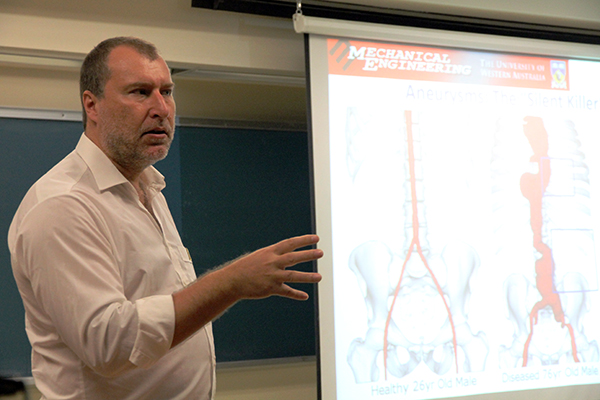Fostering international collaboration
July 26, 2016
Share

Through his research, Karol Miller, a professor at the University of Western Australia and the director of the Intelligent Systems for Medicine Laboratory (ISML), is hoping to create methods and tools which will enable “a new era of personalized medicine.”

The ISML, which aims to improve “clinical outcomes through the appropriate use of technology,” specializes in computational biomechanics in the areas of surgical simulation and image-guided surgery. Professor Miller is also a director of Computational Geomechanics Laboratory.
This has led Dr. Miller to collaborate with partners such as Gabor Fichtinger (School of Computing), the director of the Laboratory for Percutaneous Surgery (Perk Lab), which is a world leader in the development of enabling technology for image-guided medical procedures.
During a recent visit to the Queen’s University, Dr. Miller delivered a School of Computing Distinguished Speaker Seminar on Monday, July 18. The visit was supported by the Principal’s Development Fund.
As Dr. Miller explains, the work of the two labs is complementary.
“(Dr. Fichtinger’s) lab is truly the world’s best in what I call mechatronics integration in the operating theatre – getting all these various pieces of technology to work reliably together. This is not a trivial thing,” he says, adding that the modern operating room is an increasingly complex, technological theatre. “This is great for us because our expertise is in the computational biomechanics for medicine and numerical methods. So we can provide leading methods in computational science which potentially blend with Gabor’s work because then he can then make all this connect to (devices) within the operating theatres.”
Dr. Miller is a leading expert in the biomechanics of soft tissues such as the prostate, breast, liver and kidney, and is the world’s most cited author in computational biomechanics of the brain. Surgery involving soft tissues, such as the removal of tumours, is extremely difficult as the tissue moves even with the insertion of a needle, making pre-operative diagnostic images, such as an MRI, inapplicable.
“We were just talking about breast surgery for tumours and then subsequent radiotherapy. (The Perk Lab has) developed outstanding methods for surgical guidance and surgical navigation. We are able to contribute additional modules based on computational mechanics which compensate for soft tissue motion, because we can compute in real time how the breast deforms during the surgery,”Dr. Miller says. “Of course with the movement of the breast, the deformation of the breast, the target of the lesion moves so it creates a challenge for the surgeon. You don’t want to dissect something that is not the tumour.”
Helping to foster the ongoing collaboration is that Queen’s and UWA are both members of the Matariki Network of Universities, an international group of seven universities that focuses on research partnerships and undergraduate teaching. Dr. Fichtinger, also the Cancer Care Ontario Research Chair, says that the network has helped create opportunities for further collaboration as well as the exchange of ideas and students and personnel.